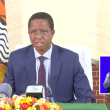GOVERNMENT has announced the closure of all schools, universities and colleges, effective Friday, March 20, 2020, to enhance the prevention of the deadly Coronavirus, also known as COVID-19, which has already ravaged some African countries.
Speaking during a media briefing in Lusaka, Tuesday, Health Minister Dr Chitalu Chilufya, flanked by General Education Minister David Mabumba, Information and Broadcasting Services Minister Dora Siliya and Higher Education Dr Brian Mushimba, announced the closure, adding that the date of re-opening the institutions would only be determined as the pandemic evolved.
He explained that the closure was meant to ensure prevention of any spread of the pandemic if it occurred.
Dr Chilufya, however, said Zambia had still not yet confirmed any case of COVID-19.
“The President of the Republic of Zambia has directed further measures to enhance protection of the country from a possible outbreak and further preventive measures on COVID-19 preparedness. Zambia has not yet confirmed any case of COVID-19, but continues to pitch very high, public health security for the country. The government has escalated the level of preparedness and put in place intense measures to respond to any event of Coronavirus disease,” Dr Chilufya said.
“In order to ensure minimum spread of COVID-19 in the first few cases and to further demonstrate government’s concern to school children and escalating the response to the COVID-19 outbreak, all schools, colleges and universities will close this Friday, and between now and this Friday, we will be disseminating to our pupils, students on how to prevent COVID-19 in the event we had initial cases in the country. We will be engaging our various stakeholders in these institutions of higher learning to ensure that we empower the communities where they are coming from with information to ensure prevention. This just brings forward the recess of these institutions and if the pandemic evolves, we will be giving guidance on the re-opening of these institutions. Let me emphasize that schools and higher institutions of learning will close on the 20th of March, Friday, in order to protect the public.”
Dr Chilufya added that vigorous mandatory screening would be enforced at all ports of entry through the country, among other measures.
“A restriction has been imposed on all foreign travel, with the public being advised to reschedule all avoidable travel. Hygiene practices to promote infection prevention in all passenger vehicles, aeroplanes, marine transport, and other conveyances, and points of entry such as airports, harbours, railway stations and ground crossings is emphasized. For persons who may have already entered the country, but were advised to self-quarantine as were not displaying symptoms at the time, it is mandatory to report of all individuals suspected to have COVID-19 to health officials; this applies even to those who may not have travelled, but are displaying symptoms of the disease, which include fever,” Dr Chilufya said.
“We are restricting public mass gathering and social distancing mandated to prevent infections. Organizations within the country have been requested to reschedule public events or use technology to advance their agenda. The screening process that has has been coordinated by our disease surveillance, the Zambia Public Health Institute, has become mandatory screening at every point of entry and has even become more vigorous. For individuals coming from places that have recorded cases in intensive screening has been increased.”
He said government, in conjunction with all airlines, had also introduced pre-departure screening for all travellers.
“Statutory Instrument 22 of 2020, which adds additional regulations has been signed, this will facilitate management and control of COVID-19 from authorities. It emphasizes mandatory screening and quarantine of international travellers, including air travel passengers, bus operators and passengers at all ports of entry. This quarantine shall be enforced for all citizens returning home from countries that have been hit by COVID-19. Government has introduced pre-departure screening in conjunction with all the airlines that fly in Zambia. All missions abroad will reveal all visas that have been issued to would-be travellers from COVID-19 high-risk countries. Pre-departure screening, not only from high risk areas, but all those transiting through high risks countries,” he explained.
“Let me emphasize that measures were proactively taken that when the COVID-19 outbreak rose, what we are doing is to escalate our response. Foreign travel to high risk countries should be postponed at the same time for those who are coming to Zambia pre-departure screening has been intensified. We are working with airlines to ensure that there is minimized risks of travellers coming into the country from high risk countries. We have also trained 580 (people) countrywide as rapid responders.”
And he further announced that buses coming from affected countries in the region would not be allowed to dock at InterCity Bus Terminus, but at Dry Port along Kafue Road.
“For buses coming from South Africa, we would like to thank Lusaka City Council for working closely with a partner for having identified a different port where these buses would dock. Buses that are coming outside Zambia will not dock at InterCity, they will dock at the dry port. This is to ensure that we screen thoroughly travellers that are coming outside the country using bus transport,” said Dr Chilufya.












